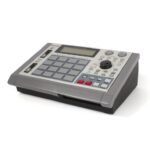Sequencing Secrets: Tips for Smoother Transitions Between Beats

Introduction: Mastering the MPC 1000
Are you looking to master smoother transitions between beats on your MPC 1000? This guide reveals essential sequencing secrets for beginner and intermediate users. Whether you’re just starting out or looking to refine your skills, understanding how to create seamless transitions is key to producing professional-sounding tracks. The MPC1000 is a powerful tool, and with the right techniques, you can unlock its full potential.
Why Smooth Transitions Matter on the MPC 1000
Seamless transitions are crucial for keeping your audience engaged. Abrupt changes between beats can disrupt the flow of your music, making it sound less polished. The
MPC 1000 offers a range of features that help you create smooth, natural transitions. By mastering these features, you can elevate your productions and stand out as a producer.
Step-by-Step Sequencing Tips for the MPC 1000
1. Use Song Mode for Arrangements
Song Mode on the MPC 1000 allows you to chain patterns together, creating a cohesive arrangement. Start by organizing your sequences in the desired order. Experiment with different combinations to find the smoothest transitions. Don’t be afraid to rearrange sections until you’re satisfied with the flow.
2. Layer Sounds for Depth
Layering is a powerful technique for adding depth and complexity to your beats. On the MPC 1000, try combining drum samples with melodic elements. This not only makes your transitions smoother but also keeps your tracks interesting. Use velocity and filter adjustments to blend layers naturally.
3. Practice Timing and Quantization
Timing is everything when it comes to transitions. The MPC 1000’s quantization feature helps tighten your sequences, ensuring each beat lands perfectly. Practice playing transitions live and use quantization to correct any timing issues. Over time, you’ll develop a feel for what works best.
4. Automate Effects for Dynamic Changes
Adding effects like filters, delays, or reverb can make transitions more dynamic. Automate these effects on the MPC1000 to gradually introduce or remove elements between sections. This technique adds movement and keeps listeners engaged throughout your track.
Internal and Outbound Resources
For more tips and tutorials, visit our MPC 1000 Resources page. You’ll find guides on advanced sequencing, sound design, and troubleshooting common issues.
To learn more about the hardware, check out the Official Akai MPC 1000 page. This resource provides detailed specifications, firmware updates, and user manuals to help you get the most out of your device.
Common Mistakes and How to Avoid Them
Many producers overlook the importance of transitions, focusing solely on individual beats. Avoid abrupt changes by planning your arrangements and using the MPC 1000’s features to their fullest. Regularly review your tracks and listen for any sections that feel out of place. Small adjustments can make a big difference in the overall flow.
